European Business: International Trade, Exchange Rates, and Policies
VerifiedAdded on 2019/12/04
|11
|3238
|215
Report
AI Summary
This report provides a comprehensive analysis of European business, focusing on the importance of international trade, comparative and absolute advantage, and the structure of balance of payments. It examines the role of exchange rates in European business, the advantages of a single European currency, and the differences between free trade and protectionism. The report also explores the role of EU institutions in policy-making, the profile of the EU trading bloc, and the significance of geographic and occupational mobility. Furthermore, it includes an audit of EU funding streams and an action plan for companies operating within the EU. The report uses examples from the UK, Czech Republic, France, and other European countries to illustrate key concepts and issues.
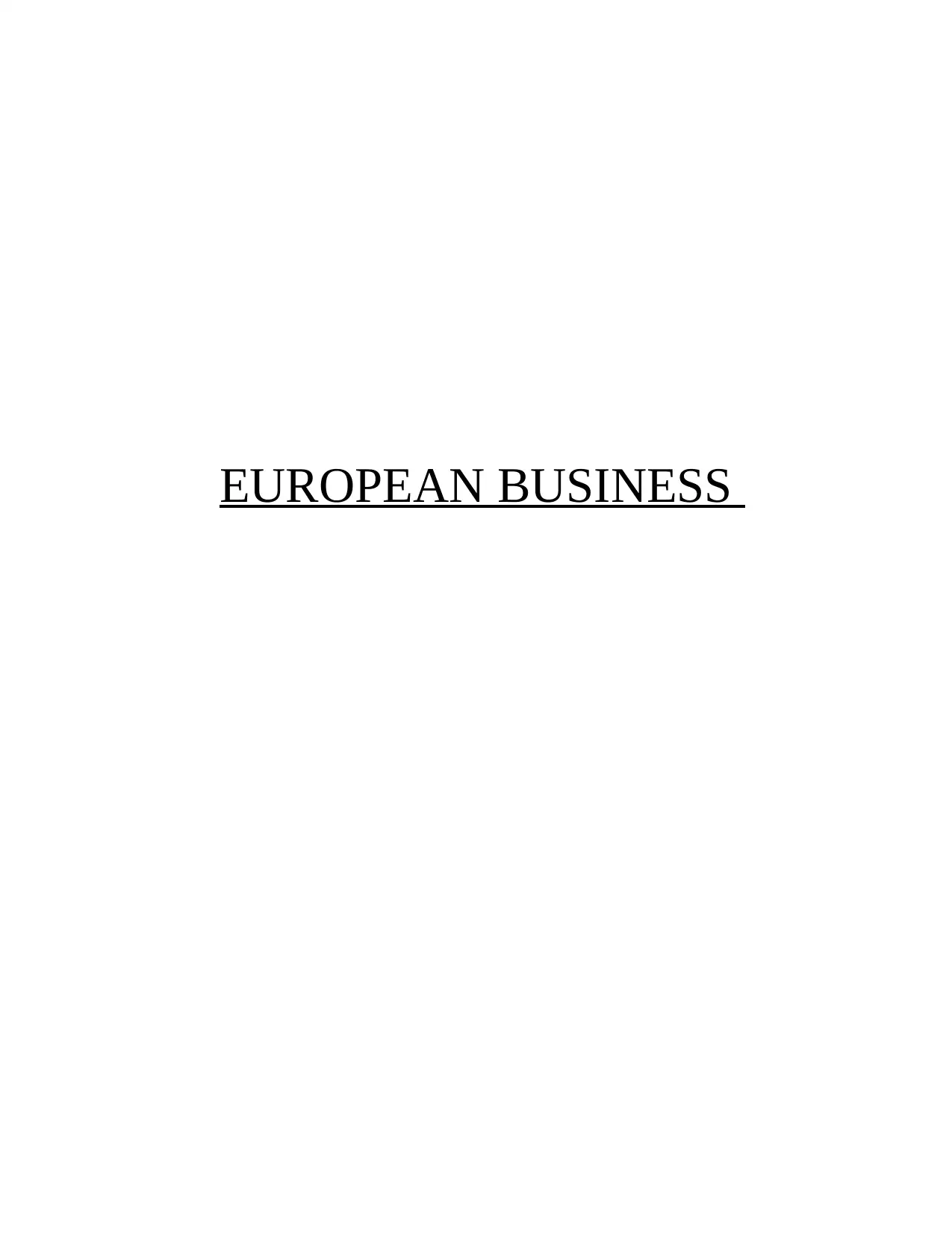
EUROPEAN BUSINESS
Paraphrase This Document
Need a fresh take? Get an instant paraphrase of this document with our AI Paraphraser
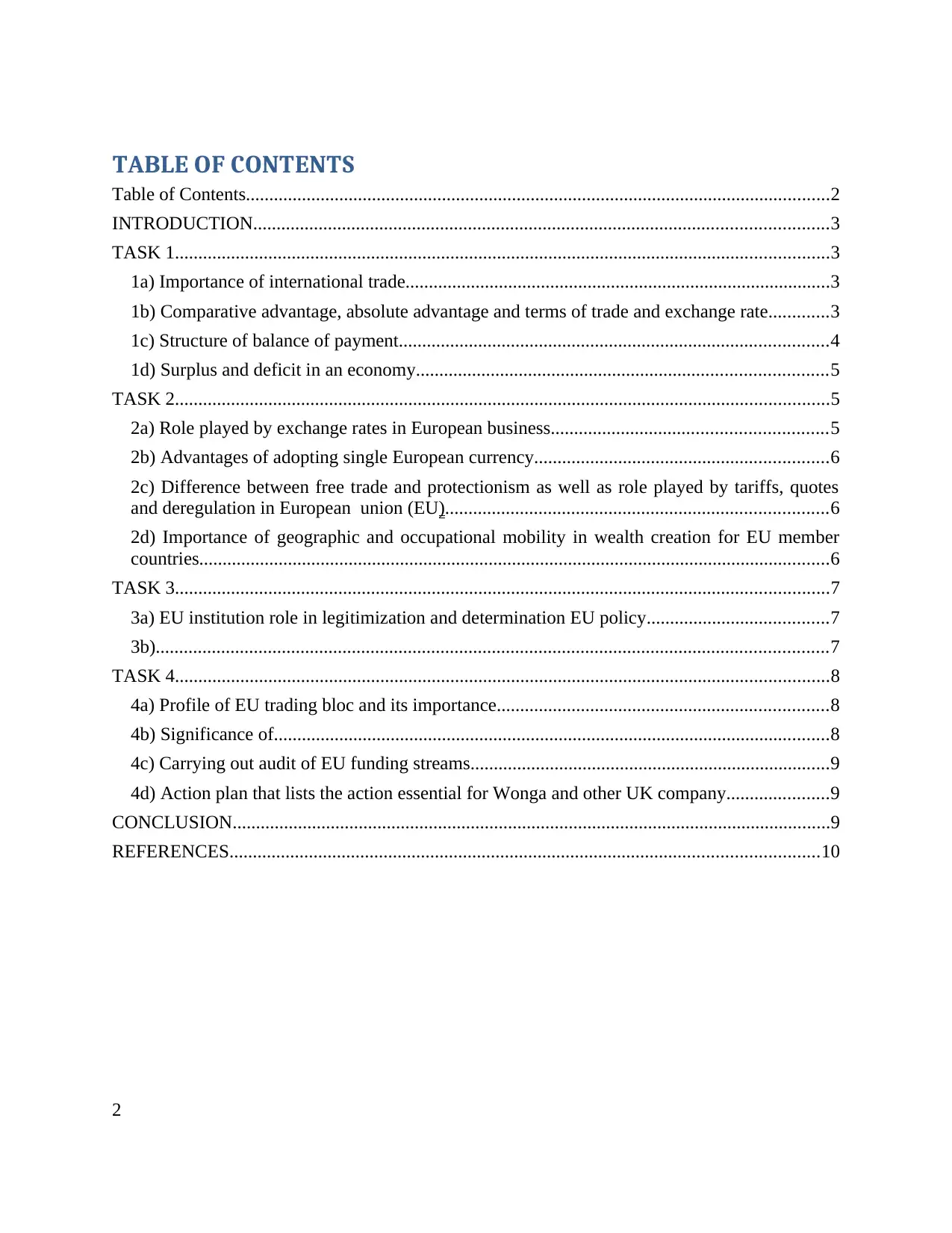
TABLE OF CONTENTS
Table of Contents.............................................................................................................................2
INTRODUCTION...........................................................................................................................3
TASK 1............................................................................................................................................3
1a) Importance of international trade...........................................................................................3
1b) Comparative advantage, absolute advantage and terms of trade and exchange rate.............3
1c) Structure of balance of payment............................................................................................4
1d) Surplus and deficit in an economy........................................................................................5
TASK 2............................................................................................................................................5
2a) Role played by exchange rates in European business...........................................................5
2b) Advantages of adopting single European currency...............................................................6
2c) Difference between free trade and protectionism as well as role played by tariffs, quotes
and deregulation in European union (EU)..................................................................................6
2d) Importance of geographic and occupational mobility in wealth creation for EU member
countries.......................................................................................................................................6
TASK 3............................................................................................................................................7
3a) EU institution role in legitimization and determination EU policy.......................................7
3b)................................................................................................................................................7
TASK 4............................................................................................................................................8
4a) Profile of EU trading bloc and its importance.......................................................................8
4b) Significance of.......................................................................................................................8
4c) Carrying out audit of EU funding streams.............................................................................9
4d) Action plan that lists the action essential for Wonga and other UK company......................9
CONCLUSION................................................................................................................................9
REFERENCES..............................................................................................................................10
2
Table of Contents.............................................................................................................................2
INTRODUCTION...........................................................................................................................3
TASK 1............................................................................................................................................3
1a) Importance of international trade...........................................................................................3
1b) Comparative advantage, absolute advantage and terms of trade and exchange rate.............3
1c) Structure of balance of payment............................................................................................4
1d) Surplus and deficit in an economy........................................................................................5
TASK 2............................................................................................................................................5
2a) Role played by exchange rates in European business...........................................................5
2b) Advantages of adopting single European currency...............................................................6
2c) Difference between free trade and protectionism as well as role played by tariffs, quotes
and deregulation in European union (EU)..................................................................................6
2d) Importance of geographic and occupational mobility in wealth creation for EU member
countries.......................................................................................................................................6
TASK 3............................................................................................................................................7
3a) EU institution role in legitimization and determination EU policy.......................................7
3b)................................................................................................................................................7
TASK 4............................................................................................................................................8
4a) Profile of EU trading bloc and its importance.......................................................................8
4b) Significance of.......................................................................................................................8
4c) Carrying out audit of EU funding streams.............................................................................9
4d) Action plan that lists the action essential for Wonga and other UK company......................9
CONCLUSION................................................................................................................................9
REFERENCES..............................................................................................................................10
2
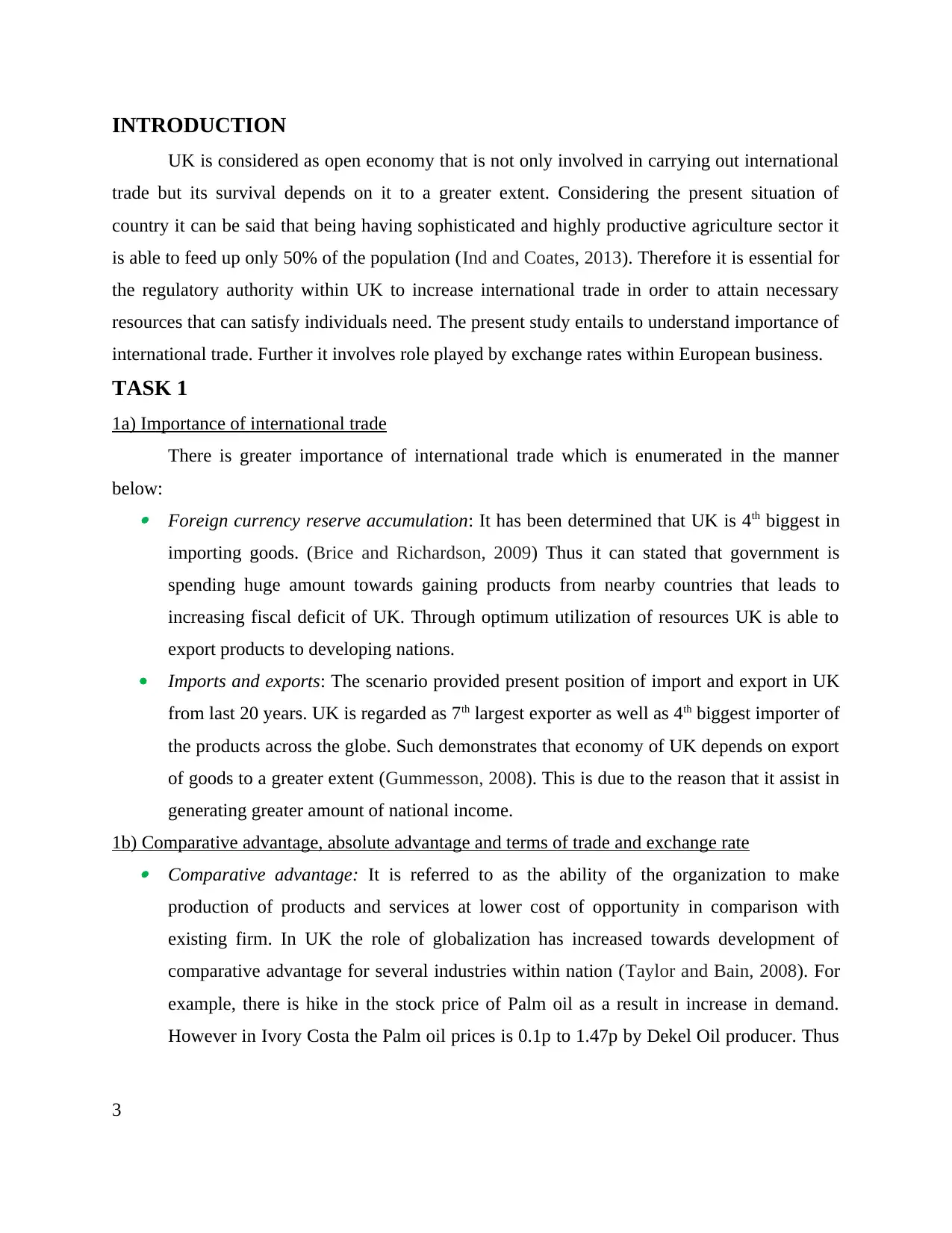
INTRODUCTION
UK is considered as open economy that is not only involved in carrying out international
trade but its survival depends on it to a greater extent. Considering the present situation of
country it can be said that being having sophisticated and highly productive agriculture sector it
is able to feed up only 50% of the population (Ind and Coates, 2013). Therefore it is essential for
the regulatory authority within UK to increase international trade in order to attain necessary
resources that can satisfy individuals need. The present study entails to understand importance of
international trade. Further it involves role played by exchange rates within European business.
TASK 1
1a) Importance of international trade
There is greater importance of international trade which is enumerated in the manner
below: Foreign currency reserve accumulation: It has been determined that UK is 4th biggest in
importing goods. (Brice and Richardson, 2009) Thus it can stated that government is
spending huge amount towards gaining products from nearby countries that leads to
increasing fiscal deficit of UK. Through optimum utilization of resources UK is able to
export products to developing nations.
Imports and exports: The scenario provided present position of import and export in UK
from last 20 years. UK is regarded as 7th largest exporter as well as 4th biggest importer of
the products across the globe. Such demonstrates that economy of UK depends on export
of goods to a greater extent (Gummesson, 2008). This is due to the reason that it assist in
generating greater amount of national income.
1b) Comparative advantage, absolute advantage and terms of trade and exchange rate Comparative advantage: It is referred to as the ability of the organization to make
production of products and services at lower cost of opportunity in comparison with
existing firm. In UK the role of globalization has increased towards development of
comparative advantage for several industries within nation (Taylor and Bain, 2008). For
example, there is hike in the stock price of Palm oil as a result in increase in demand.
However in Ivory Costa the Palm oil prices is 0.1p to 1.47p by Dekel Oil producer. Thus
3
UK is considered as open economy that is not only involved in carrying out international
trade but its survival depends on it to a greater extent. Considering the present situation of
country it can be said that being having sophisticated and highly productive agriculture sector it
is able to feed up only 50% of the population (Ind and Coates, 2013). Therefore it is essential for
the regulatory authority within UK to increase international trade in order to attain necessary
resources that can satisfy individuals need. The present study entails to understand importance of
international trade. Further it involves role played by exchange rates within European business.
TASK 1
1a) Importance of international trade
There is greater importance of international trade which is enumerated in the manner
below: Foreign currency reserve accumulation: It has been determined that UK is 4th biggest in
importing goods. (Brice and Richardson, 2009) Thus it can stated that government is
spending huge amount towards gaining products from nearby countries that leads to
increasing fiscal deficit of UK. Through optimum utilization of resources UK is able to
export products to developing nations.
Imports and exports: The scenario provided present position of import and export in UK
from last 20 years. UK is regarded as 7th largest exporter as well as 4th biggest importer of
the products across the globe. Such demonstrates that economy of UK depends on export
of goods to a greater extent (Gummesson, 2008). This is due to the reason that it assist in
generating greater amount of national income.
1b) Comparative advantage, absolute advantage and terms of trade and exchange rate Comparative advantage: It is referred to as the ability of the organization to make
production of products and services at lower cost of opportunity in comparison with
existing firm. In UK the role of globalization has increased towards development of
comparative advantage for several industries within nation (Taylor and Bain, 2008). For
example, there is hike in the stock price of Palm oil as a result in increase in demand.
However in Ivory Costa the Palm oil prices is 0.1p to 1.47p by Dekel Oil producer. Thus
3
⊘ This is a preview!⊘
Do you want full access?
Subscribe today to unlock all pages.

Trusted by 1+ million students worldwide
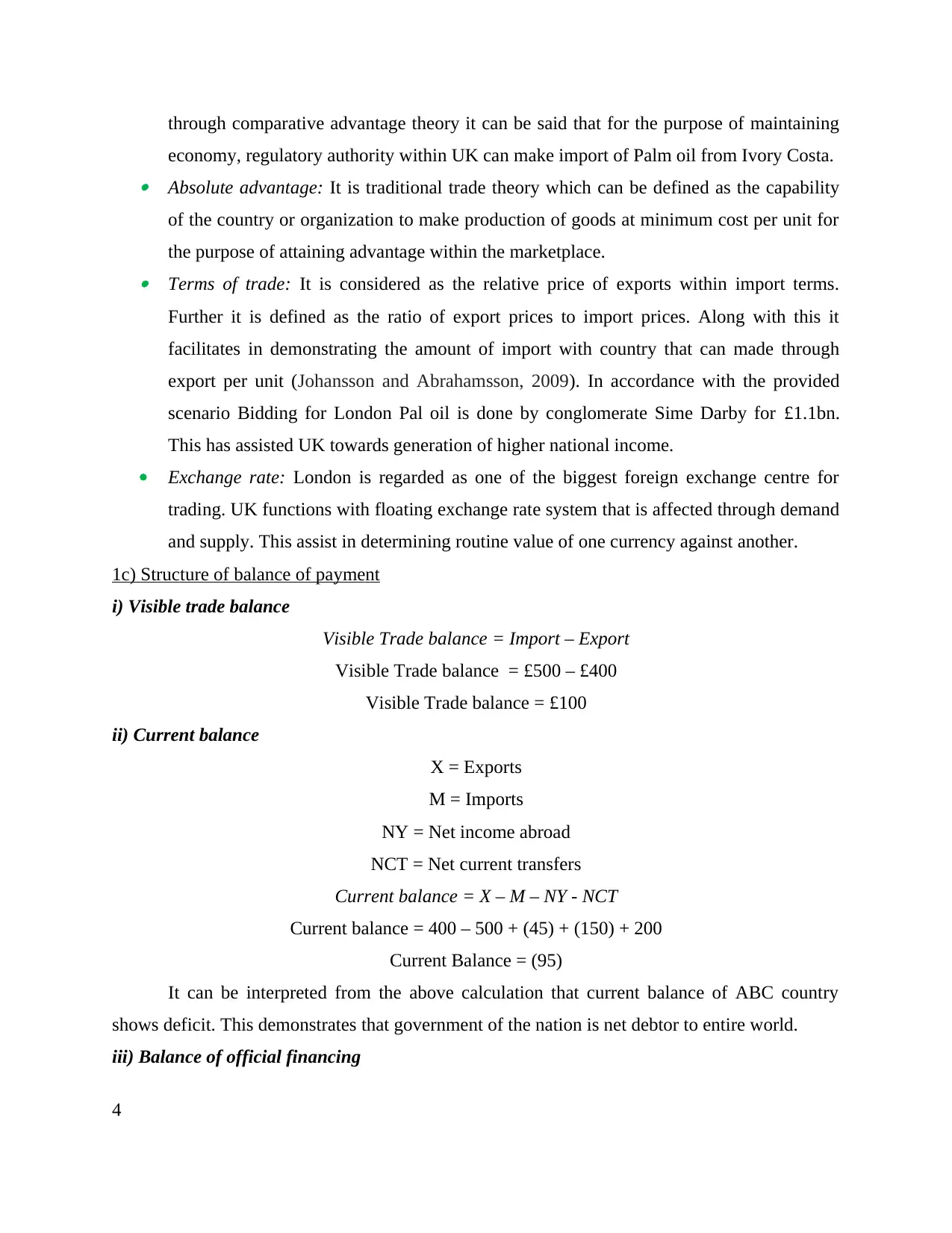
through comparative advantage theory it can be said that for the purpose of maintaining
economy, regulatory authority within UK can make import of Palm oil from Ivory Costa. Absolute advantage: It is traditional trade theory which can be defined as the capability
of the country or organization to make production of goods at minimum cost per unit for
the purpose of attaining advantage within the marketplace. Terms of trade: It is considered as the relative price of exports within import terms.
Further it is defined as the ratio of export prices to import prices. Along with this it
facilitates in demonstrating the amount of import with country that can made through
export per unit (Johansson and Abrahamsson, 2009). In accordance with the provided
scenario Bidding for London Pal oil is done by conglomerate Sime Darby for £1.1bn.
This has assisted UK towards generation of higher national income.
Exchange rate: London is regarded as one of the biggest foreign exchange centre for
trading. UK functions with floating exchange rate system that is affected through demand
and supply. This assist in determining routine value of one currency against another.
1c) Structure of balance of payment
i) Visible trade balance
Visible Trade balance = Import – Export
Visible Trade balance = £500 – £400
Visible Trade balance = £100
ii) Current balance
X = Exports
M = Imports
NY = Net income abroad
NCT = Net current transfers
Current balance = X – M – NY - NCT
Current balance = 400 – 500 + (45) + (150) + 200
Current Balance = (95)
It can be interpreted from the above calculation that current balance of ABC country
shows deficit. This demonstrates that government of the nation is net debtor to entire world.
iii) Balance of official financing
4
economy, regulatory authority within UK can make import of Palm oil from Ivory Costa. Absolute advantage: It is traditional trade theory which can be defined as the capability
of the country or organization to make production of goods at minimum cost per unit for
the purpose of attaining advantage within the marketplace. Terms of trade: It is considered as the relative price of exports within import terms.
Further it is defined as the ratio of export prices to import prices. Along with this it
facilitates in demonstrating the amount of import with country that can made through
export per unit (Johansson and Abrahamsson, 2009). In accordance with the provided
scenario Bidding for London Pal oil is done by conglomerate Sime Darby for £1.1bn.
This has assisted UK towards generation of higher national income.
Exchange rate: London is regarded as one of the biggest foreign exchange centre for
trading. UK functions with floating exchange rate system that is affected through demand
and supply. This assist in determining routine value of one currency against another.
1c) Structure of balance of payment
i) Visible trade balance
Visible Trade balance = Import – Export
Visible Trade balance = £500 – £400
Visible Trade balance = £100
ii) Current balance
X = Exports
M = Imports
NY = Net income abroad
NCT = Net current transfers
Current balance = X – M – NY - NCT
Current balance = 400 – 500 + (45) + (150) + 200
Current Balance = (95)
It can be interpreted from the above calculation that current balance of ABC country
shows deficit. This demonstrates that government of the nation is net debtor to entire world.
iii) Balance of official financing
4
Paraphrase This Document
Need a fresh take? Get an instant paraphrase of this document with our AI Paraphraser
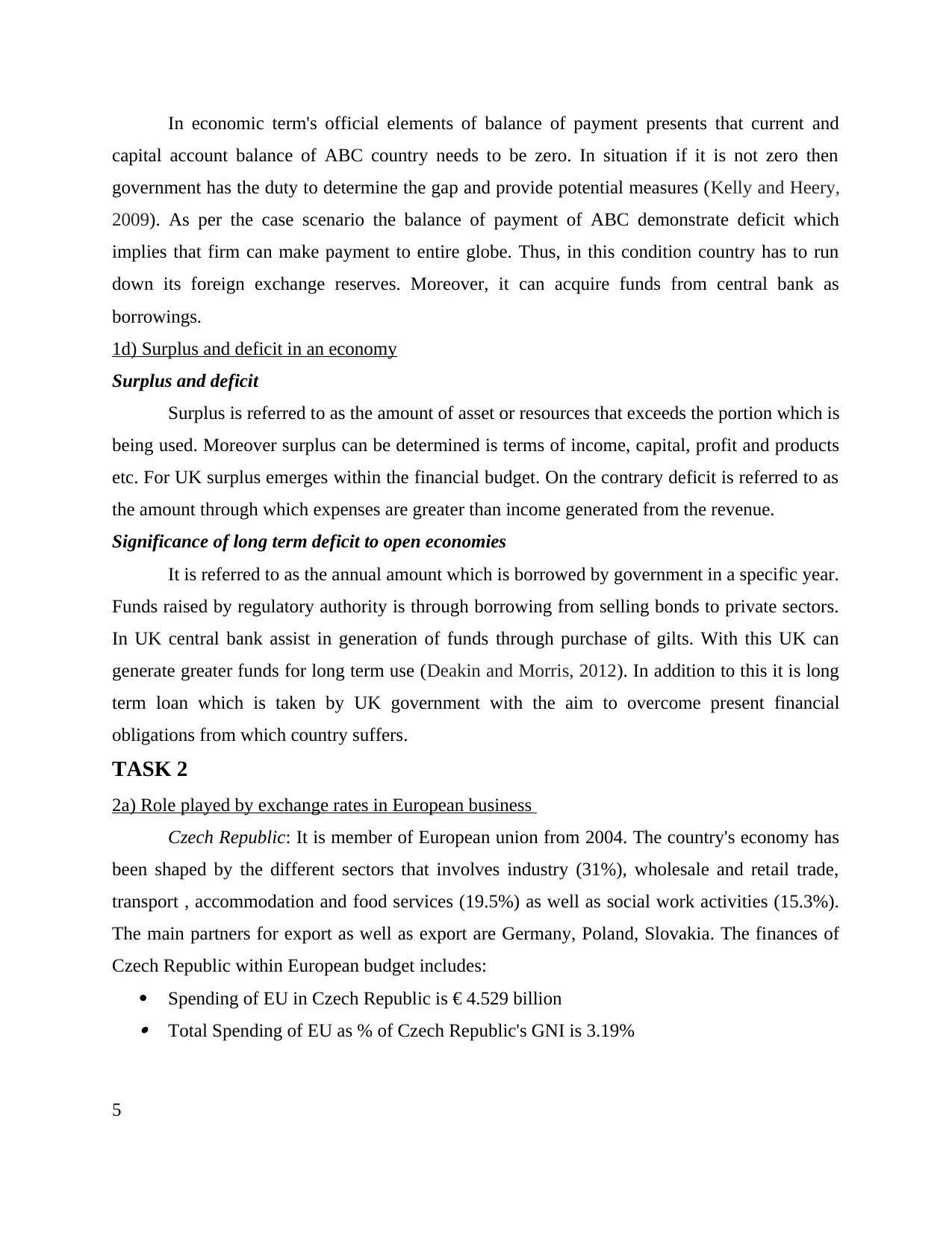
In economic term's official elements of balance of payment presents that current and
capital account balance of ABC country needs to be zero. In situation if it is not zero then
government has the duty to determine the gap and provide potential measures (Kelly and Heery,
2009). As per the case scenario the balance of payment of ABC demonstrate deficit which
implies that firm can make payment to entire globe. Thus, in this condition country has to run
down its foreign exchange reserves. Moreover, it can acquire funds from central bank as
borrowings.
1d) Surplus and deficit in an economy
Surplus and deficit
Surplus is referred to as the amount of asset or resources that exceeds the portion which is
being used. Moreover surplus can be determined is terms of income, capital, profit and products
etc. For UK surplus emerges within the financial budget. On the contrary deficit is referred to as
the amount through which expenses are greater than income generated from the revenue.
Significance of long term deficit to open economies
It is referred to as the annual amount which is borrowed by government in a specific year.
Funds raised by regulatory authority is through borrowing from selling bonds to private sectors.
In UK central bank assist in generation of funds through purchase of gilts. With this UK can
generate greater funds for long term use (Deakin and Morris, 2012). In addition to this it is long
term loan which is taken by UK government with the aim to overcome present financial
obligations from which country suffers.
TASK 2
2a) Role played by exchange rates in European business
Czech Republic: It is member of European union from 2004. The country's economy has
been shaped by the different sectors that involves industry (31%), wholesale and retail trade,
transport , accommodation and food services (19.5%) as well as social work activities (15.3%).
The main partners for export as well as export are Germany, Poland, Slovakia. The finances of
Czech Republic within European budget includes:
Spending of EU in Czech Republic is € 4.529 billion Total Spending of EU as % of Czech Republic's GNI is 3.19%
5
capital account balance of ABC country needs to be zero. In situation if it is not zero then
government has the duty to determine the gap and provide potential measures (Kelly and Heery,
2009). As per the case scenario the balance of payment of ABC demonstrate deficit which
implies that firm can make payment to entire globe. Thus, in this condition country has to run
down its foreign exchange reserves. Moreover, it can acquire funds from central bank as
borrowings.
1d) Surplus and deficit in an economy
Surplus and deficit
Surplus is referred to as the amount of asset or resources that exceeds the portion which is
being used. Moreover surplus can be determined is terms of income, capital, profit and products
etc. For UK surplus emerges within the financial budget. On the contrary deficit is referred to as
the amount through which expenses are greater than income generated from the revenue.
Significance of long term deficit to open economies
It is referred to as the annual amount which is borrowed by government in a specific year.
Funds raised by regulatory authority is through borrowing from selling bonds to private sectors.
In UK central bank assist in generation of funds through purchase of gilts. With this UK can
generate greater funds for long term use (Deakin and Morris, 2012). In addition to this it is long
term loan which is taken by UK government with the aim to overcome present financial
obligations from which country suffers.
TASK 2
2a) Role played by exchange rates in European business
Czech Republic: It is member of European union from 2004. The country's economy has
been shaped by the different sectors that involves industry (31%), wholesale and retail trade,
transport , accommodation and food services (19.5%) as well as social work activities (15.3%).
The main partners for export as well as export are Germany, Poland, Slovakia. The finances of
Czech Republic within European budget includes:
Spending of EU in Czech Republic is € 4.529 billion Total Spending of EU as % of Czech Republic's GNI is 3.19%
5
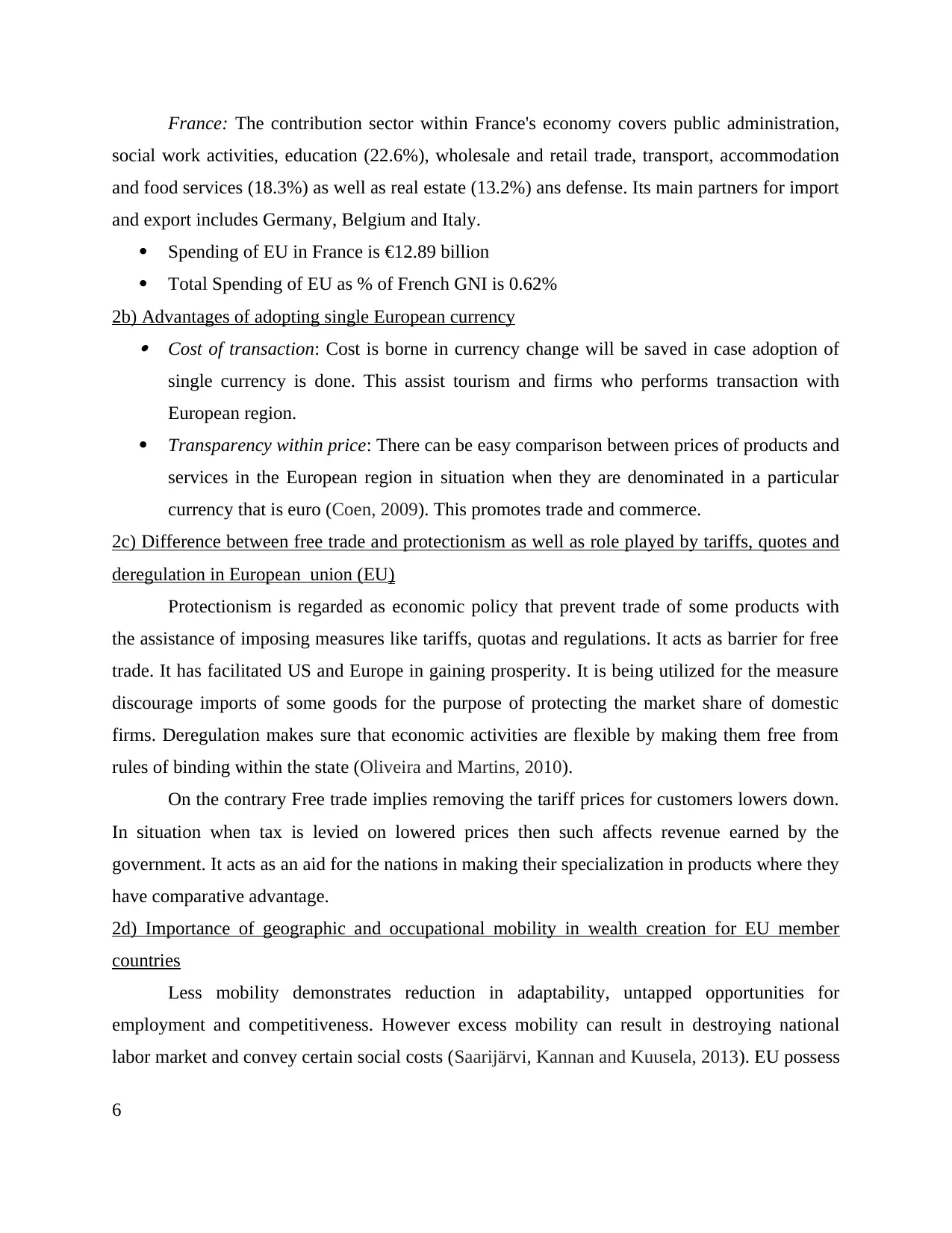
France: The contribution sector within France's economy covers public administration,
social work activities, education (22.6%), wholesale and retail trade, transport, accommodation
and food services (18.3%) as well as real estate (13.2%) ans defense. Its main partners for import
and export includes Germany, Belgium and Italy.
Spending of EU in France is €12.89 billion
Total Spending of EU as % of French GNI is 0.62%
2b) Advantages of adopting single European currency Cost of transaction: Cost is borne in currency change will be saved in case adoption of
single currency is done. This assist tourism and firms who performs transaction with
European region.
Transparency within price: There can be easy comparison between prices of products and
services in the European region in situation when they are denominated in a particular
currency that is euro (Coen, 2009). This promotes trade and commerce.
2c) Difference between free trade and protectionism as well as role played by tariffs, quotes and
deregulation in European union (EU)
Protectionism is regarded as economic policy that prevent trade of some products with
the assistance of imposing measures like tariffs, quotas and regulations. It acts as barrier for free
trade. It has facilitated US and Europe in gaining prosperity. It is being utilized for the measure
discourage imports of some goods for the purpose of protecting the market share of domestic
firms. Deregulation makes sure that economic activities are flexible by making them free from
rules of binding within the state (Oliveira and Martins, 2010).
On the contrary Free trade implies removing the tariff prices for customers lowers down.
In situation when tax is levied on lowered prices then such affects revenue earned by the
government. It acts as an aid for the nations in making their specialization in products where they
have comparative advantage.
2d) Importance of geographic and occupational mobility in wealth creation for EU member
countries
Less mobility demonstrates reduction in adaptability, untapped opportunities for
employment and competitiveness. However excess mobility can result in destroying national
labor market and convey certain social costs (Saarijärvi, Kannan and Kuusela, 2013). EU possess
6
social work activities, education (22.6%), wholesale and retail trade, transport, accommodation
and food services (18.3%) as well as real estate (13.2%) ans defense. Its main partners for import
and export includes Germany, Belgium and Italy.
Spending of EU in France is €12.89 billion
Total Spending of EU as % of French GNI is 0.62%
2b) Advantages of adopting single European currency Cost of transaction: Cost is borne in currency change will be saved in case adoption of
single currency is done. This assist tourism and firms who performs transaction with
European region.
Transparency within price: There can be easy comparison between prices of products and
services in the European region in situation when they are denominated in a particular
currency that is euro (Coen, 2009). This promotes trade and commerce.
2c) Difference between free trade and protectionism as well as role played by tariffs, quotes and
deregulation in European union (EU)
Protectionism is regarded as economic policy that prevent trade of some products with
the assistance of imposing measures like tariffs, quotas and regulations. It acts as barrier for free
trade. It has facilitated US and Europe in gaining prosperity. It is being utilized for the measure
discourage imports of some goods for the purpose of protecting the market share of domestic
firms. Deregulation makes sure that economic activities are flexible by making them free from
rules of binding within the state (Oliveira and Martins, 2010).
On the contrary Free trade implies removing the tariff prices for customers lowers down.
In situation when tax is levied on lowered prices then such affects revenue earned by the
government. It acts as an aid for the nations in making their specialization in products where they
have comparative advantage.
2d) Importance of geographic and occupational mobility in wealth creation for EU member
countries
Less mobility demonstrates reduction in adaptability, untapped opportunities for
employment and competitiveness. However excess mobility can result in destroying national
labor market and convey certain social costs (Saarijärvi, Kannan and Kuusela, 2013). EU possess
6
⊘ This is a preview!⊘
Do you want full access?
Subscribe today to unlock all pages.

Trusted by 1+ million students worldwide
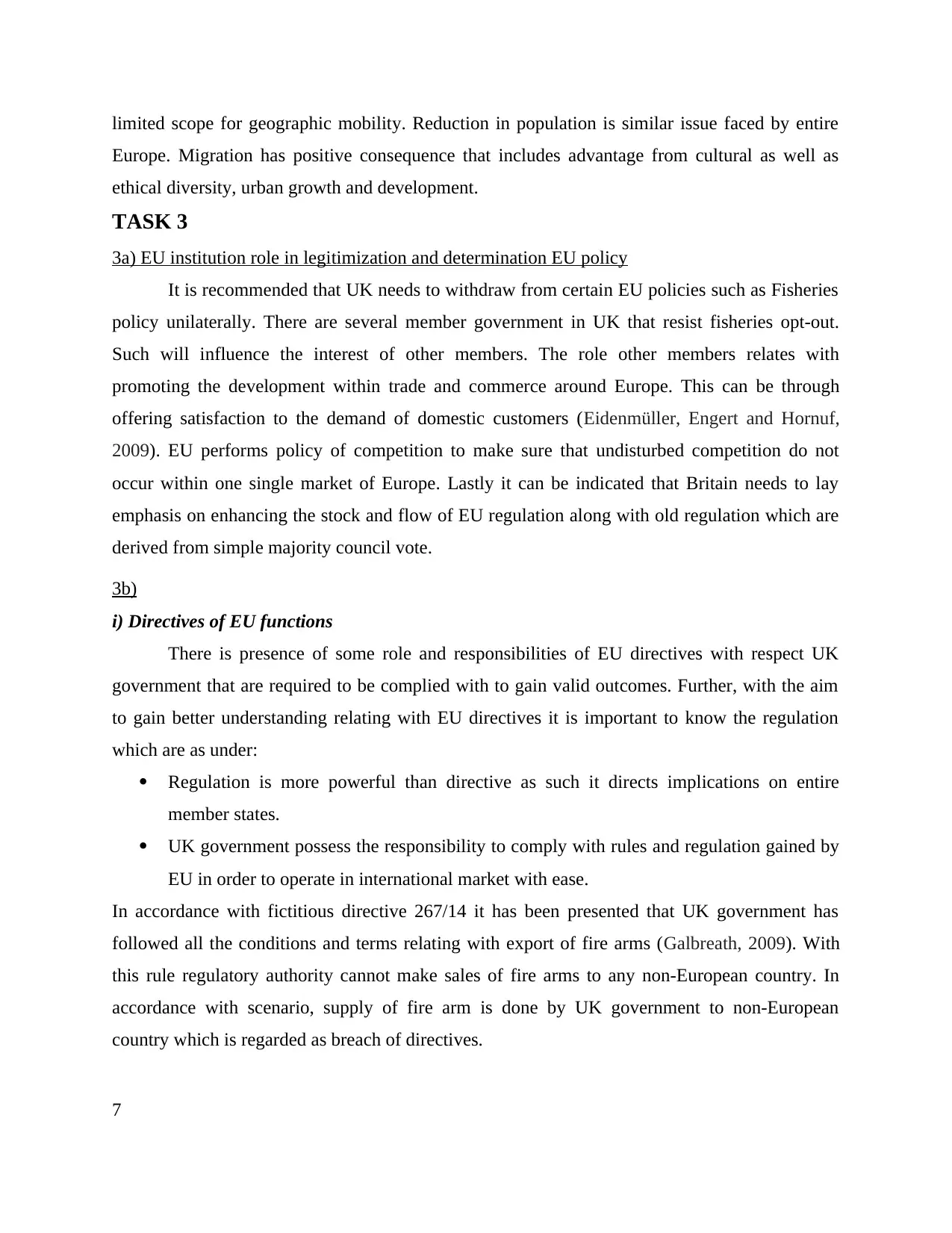
limited scope for geographic mobility. Reduction in population is similar issue faced by entire
Europe. Migration has positive consequence that includes advantage from cultural as well as
ethical diversity, urban growth and development.
TASK 3
3a) EU institution role in legitimization and determination EU policy
It is recommended that UK needs to withdraw from certain EU policies such as Fisheries
policy unilaterally. There are several member government in UK that resist fisheries opt-out.
Such will influence the interest of other members. The role other members relates with
promoting the development within trade and commerce around Europe. This can be through
offering satisfaction to the demand of domestic customers (Eidenmüller, Engert and Hornuf,
2009). EU performs policy of competition to make sure that undisturbed competition do not
occur within one single market of Europe. Lastly it can be indicated that Britain needs to lay
emphasis on enhancing the stock and flow of EU regulation along with old regulation which are
derived from simple majority council vote.
3b)
i) Directives of EU functions
There is presence of some role and responsibilities of EU directives with respect UK
government that are required to be complied with to gain valid outcomes. Further, with the aim
to gain better understanding relating with EU directives it is important to know the regulation
which are as under:
Regulation is more powerful than directive as such it directs implications on entire
member states.
UK government possess the responsibility to comply with rules and regulation gained by
EU in order to operate in international market with ease.
In accordance with fictitious directive 267/14 it has been presented that UK government has
followed all the conditions and terms relating with export of fire arms (Galbreath, 2009). With
this rule regulatory authority cannot make sales of fire arms to any non-European country. In
accordance with scenario, supply of fire arm is done by UK government to non-European
country which is regarded as breach of directives.
7
Europe. Migration has positive consequence that includes advantage from cultural as well as
ethical diversity, urban growth and development.
TASK 3
3a) EU institution role in legitimization and determination EU policy
It is recommended that UK needs to withdraw from certain EU policies such as Fisheries
policy unilaterally. There are several member government in UK that resist fisheries opt-out.
Such will influence the interest of other members. The role other members relates with
promoting the development within trade and commerce around Europe. This can be through
offering satisfaction to the demand of domestic customers (Eidenmüller, Engert and Hornuf,
2009). EU performs policy of competition to make sure that undisturbed competition do not
occur within one single market of Europe. Lastly it can be indicated that Britain needs to lay
emphasis on enhancing the stock and flow of EU regulation along with old regulation which are
derived from simple majority council vote.
3b)
i) Directives of EU functions
There is presence of some role and responsibilities of EU directives with respect UK
government that are required to be complied with to gain valid outcomes. Further, with the aim
to gain better understanding relating with EU directives it is important to know the regulation
which are as under:
Regulation is more powerful than directive as such it directs implications on entire
member states.
UK government possess the responsibility to comply with rules and regulation gained by
EU in order to operate in international market with ease.
In accordance with fictitious directive 267/14 it has been presented that UK government has
followed all the conditions and terms relating with export of fire arms (Galbreath, 2009). With
this rule regulatory authority cannot make sales of fire arms to any non-European country. In
accordance with scenario, supply of fire arm is done by UK government to non-European
country which is regarded as breach of directives.
7
Paraphrase This Document
Need a fresh take? Get an instant paraphrase of this document with our AI Paraphraser
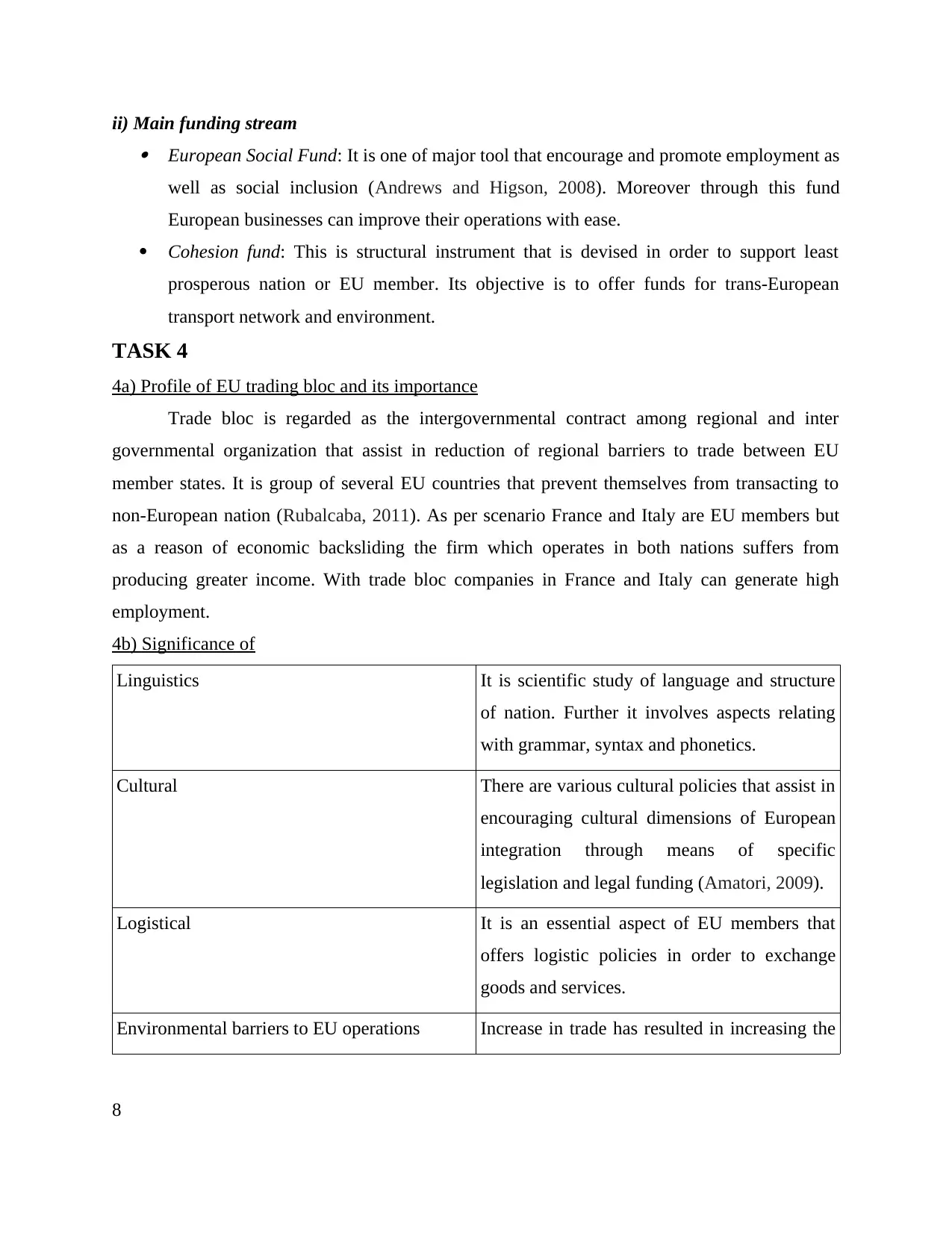
ii) Main funding stream European Social Fund: It is one of major tool that encourage and promote employment as
well as social inclusion (Andrews and Higson, 2008). Moreover through this fund
European businesses can improve their operations with ease.
Cohesion fund: This is structural instrument that is devised in order to support least
prosperous nation or EU member. Its objective is to offer funds for trans-European
transport network and environment.
TASK 4
4a) Profile of EU trading bloc and its importance
Trade bloc is regarded as the intergovernmental contract among regional and inter
governmental organization that assist in reduction of regional barriers to trade between EU
member states. It is group of several EU countries that prevent themselves from transacting to
non-European nation (Rubalcaba, 2011). As per scenario France and Italy are EU members but
as a reason of economic backsliding the firm which operates in both nations suffers from
producing greater income. With trade bloc companies in France and Italy can generate high
employment.
4b) Significance of
Linguistics It is scientific study of language and structure
of nation. Further it involves aspects relating
with grammar, syntax and phonetics.
Cultural There are various cultural policies that assist in
encouraging cultural dimensions of European
integration through means of specific
legislation and legal funding (Amatori, 2009).
Logistical It is an essential aspect of EU members that
offers logistic policies in order to exchange
goods and services.
Environmental barriers to EU operations Increase in trade has resulted in increasing the
8
well as social inclusion (Andrews and Higson, 2008). Moreover through this fund
European businesses can improve their operations with ease.
Cohesion fund: This is structural instrument that is devised in order to support least
prosperous nation or EU member. Its objective is to offer funds for trans-European
transport network and environment.
TASK 4
4a) Profile of EU trading bloc and its importance
Trade bloc is regarded as the intergovernmental contract among regional and inter
governmental organization that assist in reduction of regional barriers to trade between EU
member states. It is group of several EU countries that prevent themselves from transacting to
non-European nation (Rubalcaba, 2011). As per scenario France and Italy are EU members but
as a reason of economic backsliding the firm which operates in both nations suffers from
producing greater income. With trade bloc companies in France and Italy can generate high
employment.
4b) Significance of
Linguistics It is scientific study of language and structure
of nation. Further it involves aspects relating
with grammar, syntax and phonetics.
Cultural There are various cultural policies that assist in
encouraging cultural dimensions of European
integration through means of specific
legislation and legal funding (Amatori, 2009).
Logistical It is an essential aspect of EU members that
offers logistic policies in order to exchange
goods and services.
Environmental barriers to EU operations Increase in trade has resulted in increasing the
8
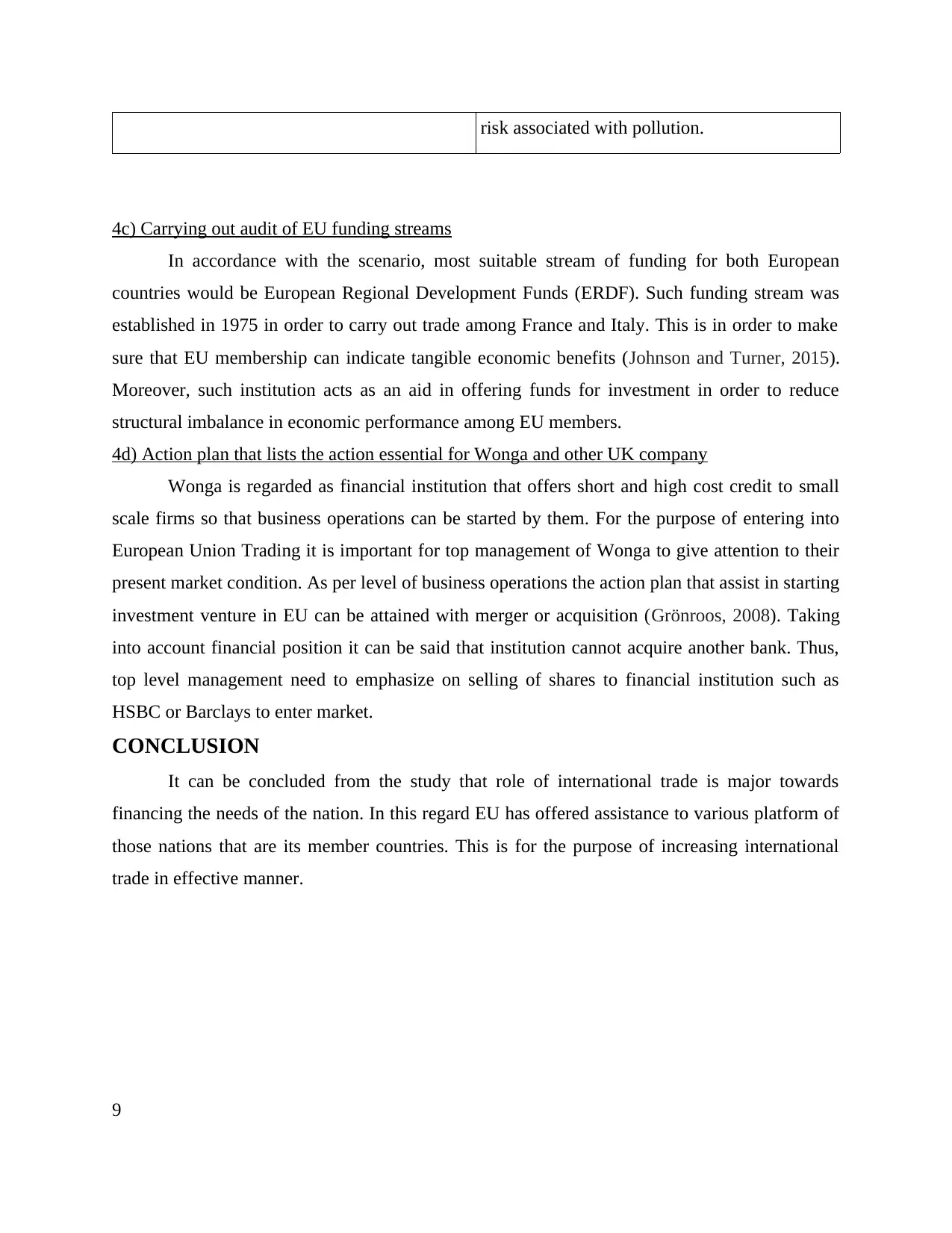
risk associated with pollution.
4c) Carrying out audit of EU funding streams
In accordance with the scenario, most suitable stream of funding for both European
countries would be European Regional Development Funds (ERDF). Such funding stream was
established in 1975 in order to carry out trade among France and Italy. This is in order to make
sure that EU membership can indicate tangible economic benefits (Johnson and Turner, 2015).
Moreover, such institution acts as an aid in offering funds for investment in order to reduce
structural imbalance in economic performance among EU members.
4d) Action plan that lists the action essential for Wonga and other UK company
Wonga is regarded as financial institution that offers short and high cost credit to small
scale firms so that business operations can be started by them. For the purpose of entering into
European Union Trading it is important for top management of Wonga to give attention to their
present market condition. As per level of business operations the action plan that assist in starting
investment venture in EU can be attained with merger or acquisition (Grönroos, 2008). Taking
into account financial position it can be said that institution cannot acquire another bank. Thus,
top level management need to emphasize on selling of shares to financial institution such as
HSBC or Barclays to enter market.
CONCLUSION
It can be concluded from the study that role of international trade is major towards
financing the needs of the nation. In this regard EU has offered assistance to various platform of
those nations that are its member countries. This is for the purpose of increasing international
trade in effective manner.
9
4c) Carrying out audit of EU funding streams
In accordance with the scenario, most suitable stream of funding for both European
countries would be European Regional Development Funds (ERDF). Such funding stream was
established in 1975 in order to carry out trade among France and Italy. This is in order to make
sure that EU membership can indicate tangible economic benefits (Johnson and Turner, 2015).
Moreover, such institution acts as an aid in offering funds for investment in order to reduce
structural imbalance in economic performance among EU members.
4d) Action plan that lists the action essential for Wonga and other UK company
Wonga is regarded as financial institution that offers short and high cost credit to small
scale firms so that business operations can be started by them. For the purpose of entering into
European Union Trading it is important for top management of Wonga to give attention to their
present market condition. As per level of business operations the action plan that assist in starting
investment venture in EU can be attained with merger or acquisition (Grönroos, 2008). Taking
into account financial position it can be said that institution cannot acquire another bank. Thus,
top level management need to emphasize on selling of shares to financial institution such as
HSBC or Barclays to enter market.
CONCLUSION
It can be concluded from the study that role of international trade is major towards
financing the needs of the nation. In this regard EU has offered assistance to various platform of
those nations that are its member countries. This is for the purpose of increasing international
trade in effective manner.
9
⊘ This is a preview!⊘
Do you want full access?
Subscribe today to unlock all pages.

Trusted by 1+ million students worldwide
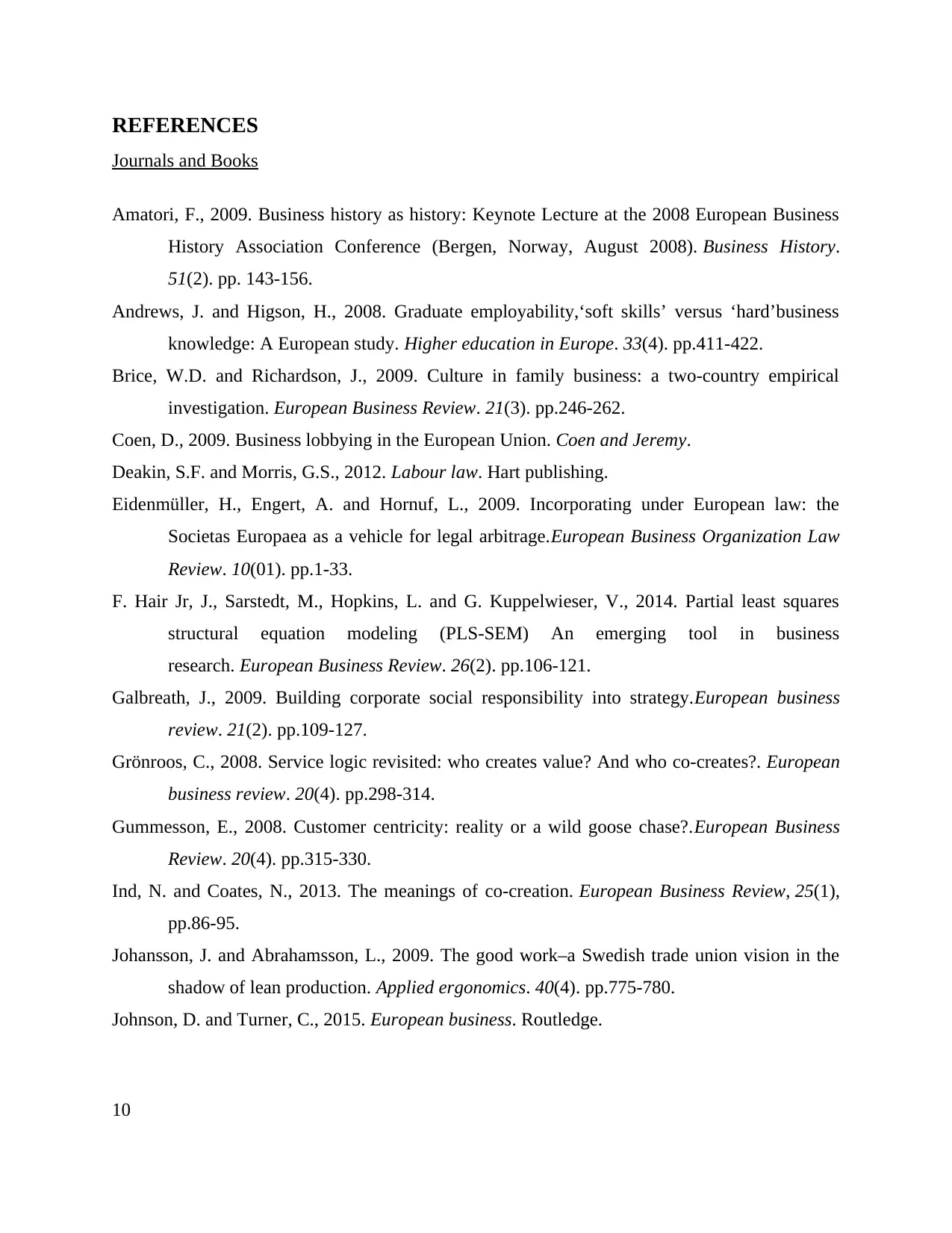
REFERENCES
Journals and Books
Amatori, F., 2009. Business history as history: Keynote Lecture at the 2008 European Business
History Association Conference (Bergen, Norway, August 2008). Business History.
51(2). pp. 143-156.
Andrews, J. and Higson, H., 2008. Graduate employability,‘soft skills’ versus ‘hard’business
knowledge: A European study. Higher education in Europe. 33(4). pp.411-422.
Brice, W.D. and Richardson, J., 2009. Culture in family business: a two-country empirical
investigation. European Business Review. 21(3). pp.246-262.
Coen, D., 2009. Business lobbying in the European Union. Coen and Jeremy.
Deakin, S.F. and Morris, G.S., 2012. Labour law. Hart publishing.
Eidenmüller, H., Engert, A. and Hornuf, L., 2009. Incorporating under European law: the
Societas Europaea as a vehicle for legal arbitrage.European Business Organization Law
Review. 10(01). pp.1-33.
F. Hair Jr, J., Sarstedt, M., Hopkins, L. and G. Kuppelwieser, V., 2014. Partial least squares
structural equation modeling (PLS-SEM) An emerging tool in business
research. European Business Review. 26(2). pp.106-121.
Galbreath, J., 2009. Building corporate social responsibility into strategy.European business
review. 21(2). pp.109-127.
Grönroos, C., 2008. Service logic revisited: who creates value? And who co-creates?. European
business review. 20(4). pp.298-314.
Gummesson, E., 2008. Customer centricity: reality or a wild goose chase?.European Business
Review. 20(4). pp.315-330.
Ind, N. and Coates, N., 2013. The meanings of co-creation. European Business Review, 25(1),
pp.86-95.
Johansson, J. and Abrahamsson, L., 2009. The good work–a Swedish trade union vision in the
shadow of lean production. Applied ergonomics. 40(4). pp.775-780.
Johnson, D. and Turner, C., 2015. European business. Routledge.
10
Journals and Books
Amatori, F., 2009. Business history as history: Keynote Lecture at the 2008 European Business
History Association Conference (Bergen, Norway, August 2008). Business History.
51(2). pp. 143-156.
Andrews, J. and Higson, H., 2008. Graduate employability,‘soft skills’ versus ‘hard’business
knowledge: A European study. Higher education in Europe. 33(4). pp.411-422.
Brice, W.D. and Richardson, J., 2009. Culture in family business: a two-country empirical
investigation. European Business Review. 21(3). pp.246-262.
Coen, D., 2009. Business lobbying in the European Union. Coen and Jeremy.
Deakin, S.F. and Morris, G.S., 2012. Labour law. Hart publishing.
Eidenmüller, H., Engert, A. and Hornuf, L., 2009. Incorporating under European law: the
Societas Europaea as a vehicle for legal arbitrage.European Business Organization Law
Review. 10(01). pp.1-33.
F. Hair Jr, J., Sarstedt, M., Hopkins, L. and G. Kuppelwieser, V., 2014. Partial least squares
structural equation modeling (PLS-SEM) An emerging tool in business
research. European Business Review. 26(2). pp.106-121.
Galbreath, J., 2009. Building corporate social responsibility into strategy.European business
review. 21(2). pp.109-127.
Grönroos, C., 2008. Service logic revisited: who creates value? And who co-creates?. European
business review. 20(4). pp.298-314.
Gummesson, E., 2008. Customer centricity: reality or a wild goose chase?.European Business
Review. 20(4). pp.315-330.
Ind, N. and Coates, N., 2013. The meanings of co-creation. European Business Review, 25(1),
pp.86-95.
Johansson, J. and Abrahamsson, L., 2009. The good work–a Swedish trade union vision in the
shadow of lean production. Applied ergonomics. 40(4). pp.775-780.
Johnson, D. and Turner, C., 2015. European business. Routledge.
10
Paraphrase This Document
Need a fresh take? Get an instant paraphrase of this document with our AI Paraphraser
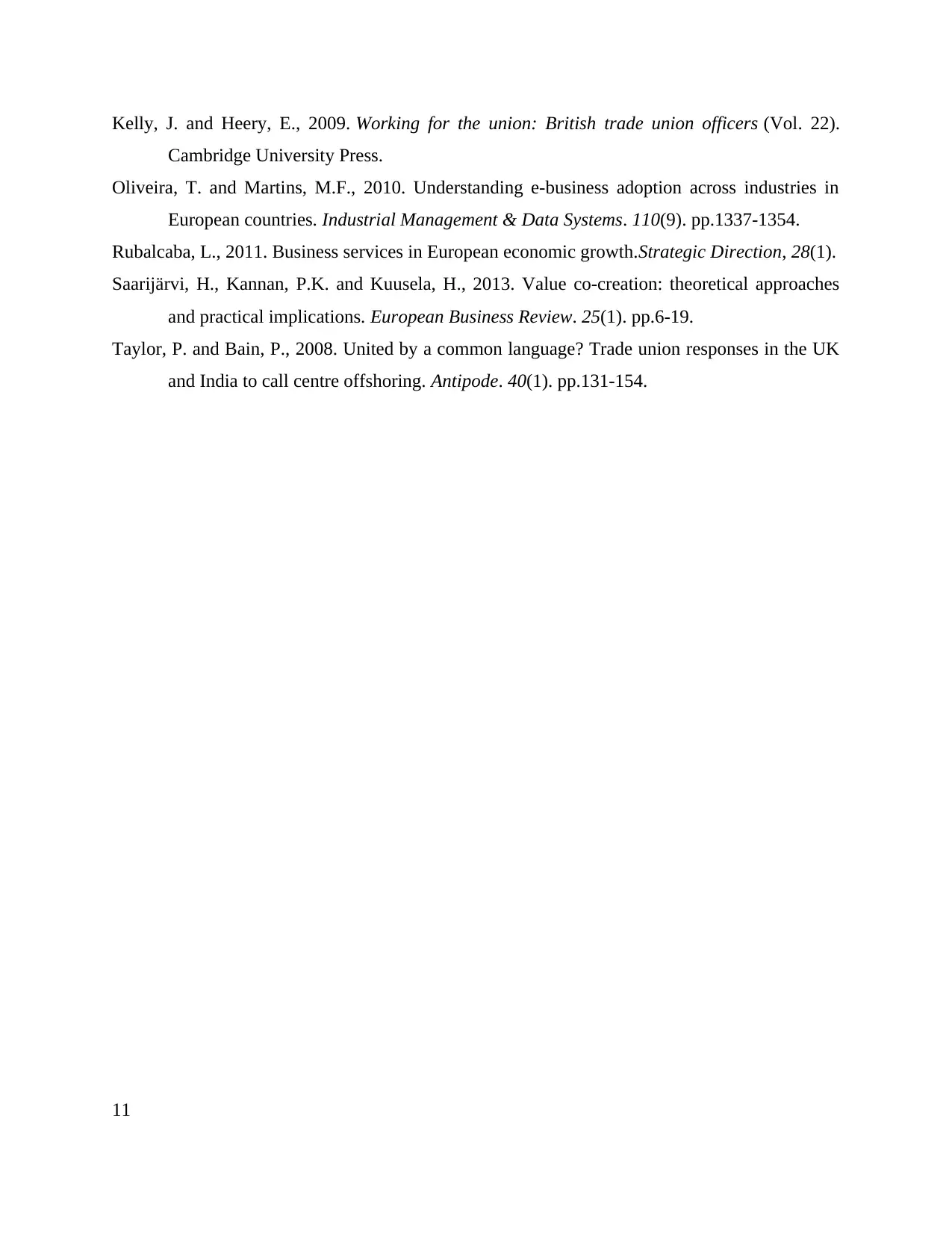
Kelly, J. and Heery, E., 2009. Working for the union: British trade union officers (Vol. 22).
Cambridge University Press.
Oliveira, T. and Martins, M.F., 2010. Understanding e-business adoption across industries in
European countries. Industrial Management & Data Systems. 110(9). pp.1337-1354.
Rubalcaba, L., 2011. Business services in European economic growth.Strategic Direction, 28(1).
Saarijärvi, H., Kannan, P.K. and Kuusela, H., 2013. Value co-creation: theoretical approaches
and practical implications. European Business Review. 25(1). pp.6-19.
Taylor, P. and Bain, P., 2008. United by a common language? Trade union responses in the UK
and India to call centre offshoring. Antipode. 40(1). pp.131-154.
11
Cambridge University Press.
Oliveira, T. and Martins, M.F., 2010. Understanding e-business adoption across industries in
European countries. Industrial Management & Data Systems. 110(9). pp.1337-1354.
Rubalcaba, L., 2011. Business services in European economic growth.Strategic Direction, 28(1).
Saarijärvi, H., Kannan, P.K. and Kuusela, H., 2013. Value co-creation: theoretical approaches
and practical implications. European Business Review. 25(1). pp.6-19.
Taylor, P. and Bain, P., 2008. United by a common language? Trade union responses in the UK
and India to call centre offshoring. Antipode. 40(1). pp.131-154.
11
1 out of 11
Related Documents
Your All-in-One AI-Powered Toolkit for Academic Success.
+13062052269
info@desklib.com
Available 24*7 on WhatsApp / Email
![[object Object]](/_next/static/media/star-bottom.7253800d.svg)
Unlock your academic potential
Copyright © 2020–2026 A2Z Services. All Rights Reserved. Developed and managed by ZUCOL.





